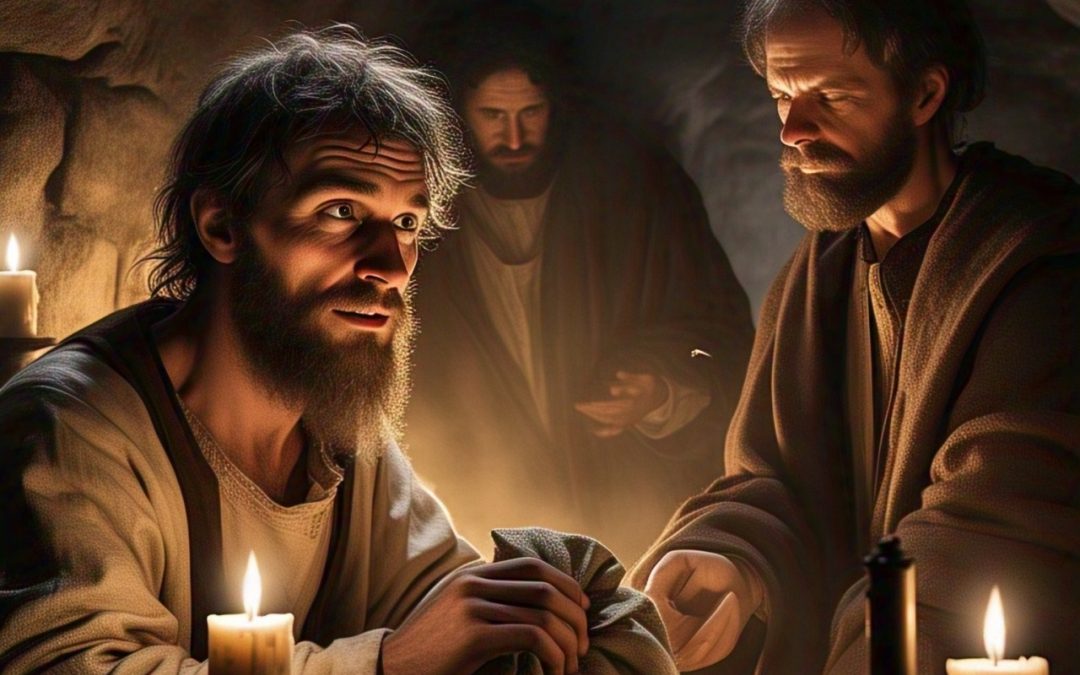
by Eron Henry | Apr 16, 2025 | Lent 2025
Holy Wednesday is a somber milestone in the Passion narrative—a day marked not by grand public teachings or miraculous displays, but by hidden betrayal and sinister plotting. While Jesus continues His ministry, forces of darkness gather in the shadows, revealing the depths of human duplicity and the staggering cost of divine love.
The Gospel accounts of this day focus primarily on Judas Iscariot, who undertakes perhaps the most infamous betrayal in human history. Having walked with Jesus for three years—witnessing His miracles, hearing His teachings, and sharing in His intimate moments—Judas now approaches the religious authorities with a chilling proposition: “What will you give me if I deliver him over to you?” The agreed price—thirty pieces of silver—echoes the ancient valuation for a slave’s life (Exodus 21:32), a paltry sum for betraying the Son of God.
The tragedy of Holy Wednesday lies not merely in the act of betrayal but in its intimacy. Judas was not an outsider or declared enemy, but one who broke bread with Jesus, one who had been trusted with the group’s finances, one who had been called “friend.” His betrayal reminds us that sometimes the deepest wounds come from those closest to us.
Yet amid this darkness, we must recognize God’s sovereign purpose. What appears as the triumph of evil is paradoxically the pathway to humanity’s redemption. The very conspiracy that seeks to eliminate Jesus becomes the means by which salvation is accomplished. The silver that changes hands as blood money will soon purchase a potter’s field, fulfilling ancient prophecy (Zechariah 11:12-13).
Holy Wednesday challenges us to examine our own hearts. Like Judas, we too can harbor mixed motives, disappointments with God’s plans, or secret sins that gradually distance us from Christ. What begins as small compromises can culminate in betrayal if left unaddressed. Yet unlike Judas, we are offered the opportunity for genuine repentance and restoration.
Prayer
Lord,
On this Holy Wednesday, we pause to remember how You were sold for thirty pieces of silver by one who called You friend. Your heart knew the pain of betrayal even as You continued the journey toward the cross.
Search our hearts today. Reveal to us the ways we too have betrayed You—through our silence when we should speak, our compromise when we should stand firm, our denial when we should acknowledge You before others.
Guard us from the self-deception that allowed Judas to rationalize his actions. Show us our true motivations and purify our hearts from all that is not of You.
We confess that like Judas, we have valued lesser things above You—comfort, security, reputation, wealth. Forgive us for the times we have traded Your presence for worldly gain.
In a world of betrayal and broken trust, make us people of integrity and faithfulness. By Your Spirit, empower us to remain loyal to You even when the path is difficult or unpopular.
May we never forget the cost of our redemption, purchased not with silver or gold, but with Your precious blood.
In the name of Christ, who endured betrayal to secure our salvation.
Amen.
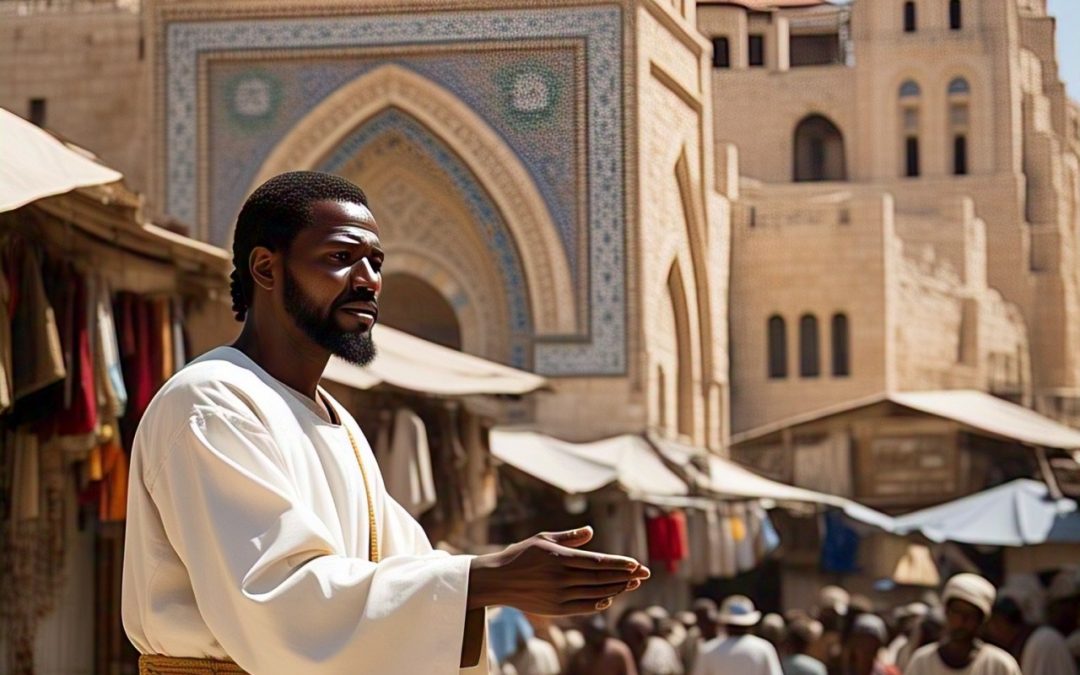
by Eron Henry | Apr 15, 2025 | Lent 2025
After cleansing the Temple the previous day, Jesus returns to Jerusalem to engage in some of His most profound and challenging teachings. This day reveals a Messiah who confronts religious hypocrisy and articulates divine truth with unwavering authority.
In the Temple courts, Jesus faces a barrage of questions designed to trap Him. The religious and political powers conspire to undermine His growing influence, yet each encounter reveals their spiritual bankruptcy and highlights Christ’s divine wisdom. When asked about paying taxes to Caesar, He deftly avoids their trap: “Give to Caesar what is Caesar’s, and to God what is God’s.” When the Sadducees attempt to discredit the resurrection with a convoluted scenario, Jesus exposes their misunderstanding of both scripture and God’s power.
The parables Jesus shares this day are particularly pointed. The Parable of the Tenants directly confronts the religious leaders, portraying them as corrupt stewards who have violated their sacred trust. The Parable of the Wedding Banquet warns that many who seem invited to God’s kingdom will ultimately reject it, while unexpected others will fill the banquet hall.
Perhaps most sobering is the Olivet Discourse, where Jesus foretells both the destruction of the Temple and the end of the age. He reminds His followers to remain vigilant and faithful, for no one knows the day or hour of His return.
Holy Tuesday challenges us to examine whether we truly recognize divine authority or merely pay it lip service. It asks whether we are like the religious leaders who knew scripture but missed its Author standing before them, or like those who humbly received Jesus’ words as truth.
Prayer
Lord of Truth and Authority,
On this Holy Tuesday, we remember how You stood in the Temple courts, speaking truth that confounded the wise and powerful of this world. Your words cut through pretense and illuminated hearts.
Examine us today as You examined the religious leaders then. Where we have embraced appearances over substance, correct us. Where we have twisted Your word to suit our desires, straighten our thinking.
Grant us discernment to recognize Your voice amidst the competing claims of our age. Help us to be not merely hearers of Your word, but faithful doers who build our lives on the solid foundation of Your truth.
May we live in constant readiness for Your return, with lamps trimmed and hearts prepared. Keep us from growing complacent or distracted by the concerns of this world.
We submit to Your authority, Christ Jesus, knowing that in Your wisdom alone can we find the path to life abundant and eternal.
Amen.
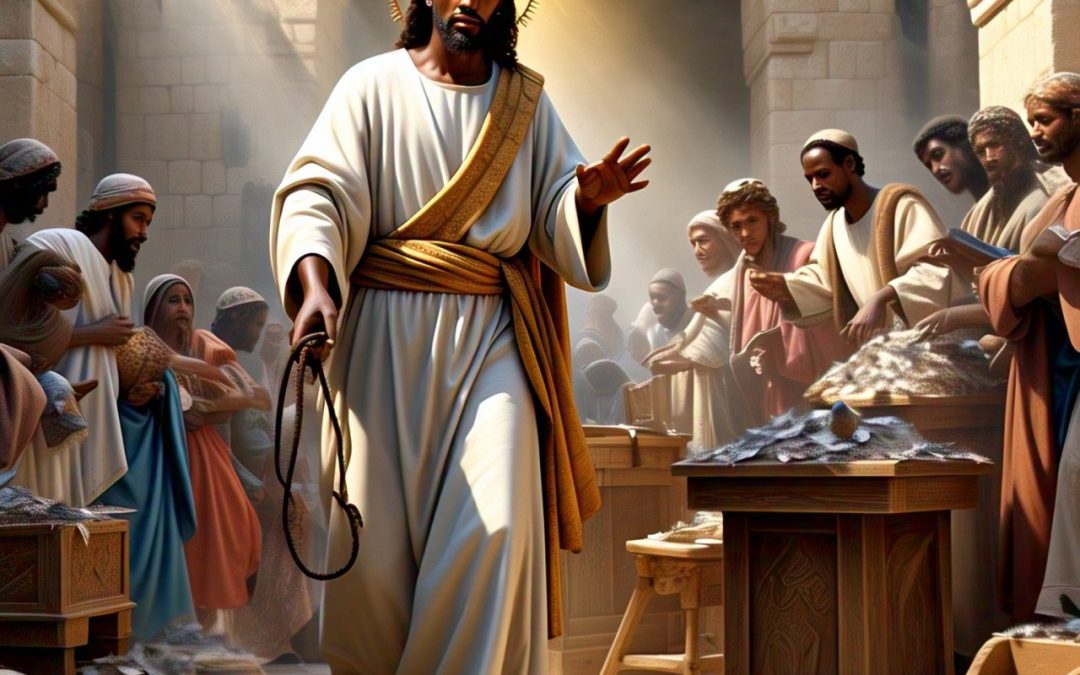
by Eron Henry | Apr 14, 2025 | Lent 2025
Holy Monday marks the beginning of the most sacred week in Christian tradition. Following the jubilant celebration of Palm Sunday, Jesus takes decisive action that reveals the true nature of His kingdom and challenges us to examine our own spiritual fruitfulness.
On this day, two seemingly distinct events become connected: the cursing of the barren fig tree and the cleansing of the Temple. Together, they speak to God’s expectation that faith must bear fruit and that worship must be authentic.
The fig tree, lush with leaves but devoid of fruit, is a metaphor for religious appearance without spiritual substance. When Jesus approaches the tree seeking nourishment, He finds only empty promises. His subsequent action—cursing the tree—is not an act of petulance but a prophetic statement about the consequences of spiritual barrenness.
Hours later, Jesus enters the Temple courts and confronts those who have transformed sacred space into a marketplace. “My house shall be called a house of prayer,” He declares, “but you have made it a den of robbers.” The merchants and money changers had created a system that exploited worshippers while maintaining the appearance of religious devotion—they were fig trees full of leaves but bearing no spiritual fruit.
These acts reveal a Messiah who demands integrity in our relationship with God. Empty ritual and performative piety cannot substitute for a heart that truly seeks to bear the fruits of justice, mercy, and faithfulness.
Prayer
Righteous Lord,
As we walk with You through this Holy Week, confront us as You confronted the Temple merchants. Examine our hearts as You examined the fig tree.
Where we have been content with appearance over substance, forgive us. Where we have exploited others while claiming Your name, correct us. Where our worship has become routine rather than authentic, renew us.
Make us like trees planted by streams of water, bearing fruit in every season. Transform our hearts into true temples where Your presence dwells and where prayer rises like incense before You.
May we never forget that You seek not the mere appearance of devotion, but hearts that overflow with love for You and for our neighbors.
In the name of Christ, who cleanses what is defiled and gives life to what is barren, we pray.
Amen.
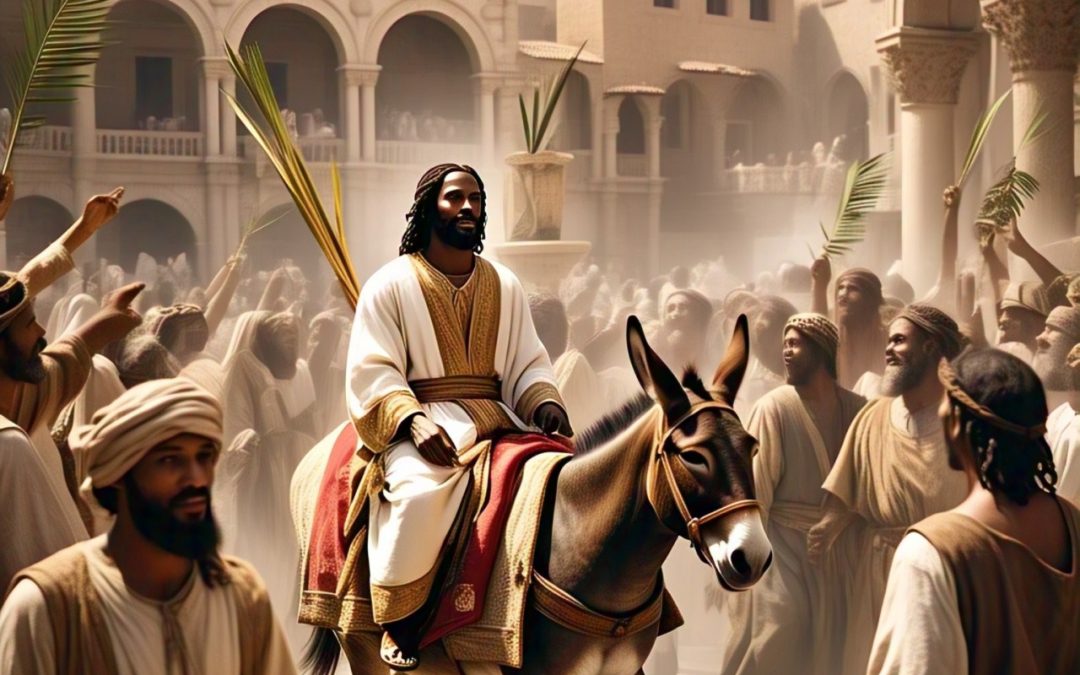
by Eron Henry | Apr 13, 2025 | Lent 2025
Palm Sunday marks the triumphal entry of Jesus into Jerusalem, an event recorded in all four Gospels. As Jesus rode into the city on a donkey, crowds spread palm branches and garments on the road, shouting “Hosanna!” and welcoming Him as the long-awaited Messiah. This moment of jubilation inaugurates Holy Week and sets in motion the events leading to Christ’s passion and resurrection.
Palm Sunday embodies a stark paradox—a triumph that leads to apparent defeat before culminating in ultimate victory. Jesus enters Jerusalem not as a conquering military leader on a warhorse but mounted on a donkey, fulfilling Zechariah’s prophecy: “See, Your king comes to You, righteous and victorious, lowly and riding on a donkey” (Zechariah 9:9). This deliberate choice reveals Christ’s kingdom as one established through humility and peace rather than dominance and violence.
The palms themselves carry rich symbolism. In ancient tradition, palm branches represented victory and were used to welcome returning conquerors. Yet here, they herald a victory that will come through surrender, a conquest achieved through sacrifice. The crowds’ acclamation of “Hosanna” (meaning “save now”) takes on multilayered significance—a plea Jesus will answer, but in ways radically different from their expectations.
Perhaps most striking is the fickle nature of human acclaim revealed in this narrative. Similar crowds that shout “Hosanna!” will, within days, cry “Crucify Him!” This dramatic reversal illuminates the fragility of popularity and the depth of Christ’s commitment to divine purpose rather than public approval.
Palm Sunday offers a powerful critique of triumphalism and superficial faith. It challenges communities to examine whether they seek a Messiah who conforms to their expectations or are willing to follow Christ’s counterintuitive path of servant leadership and sacrificial love.
The reenactment of the palm procession invites contemporary believers into an embodied practice of discipleship, physically moving behind Christ, allowing our bodies to enact what our hearts must learn. As we wave palms and sing “Hosanna,” we participate in a tradition that simultaneously celebrates Christ’s kingship while acknowledging that His throne is the cross.
In our polarized society, Palm Sunday offers wisdom about the nature of true leadership and lasting change. Jesus’ entry models authority exercised through humility rather than force, influence wielded through service rather than dominance. This vision challenges political and cultural systems built on power over others rather than power with and for others.
Jesus’ biblical narrative also speaks to our media-saturated culture’s tendency toward momentary enthusiasm without sustained commitment. It reminds us that meaningful transformation, whether personal, communal, or societal—requires moving beyond symbolic gestures to the difficult work of following Christ’s example, even when the path leads through suffering toward new life.
Prayer
King of Peace who rides on a donkey, as we raise our palms and sing our praise, align our hearts with Your humble way.
When we seek triumph without sacrifice, when we desire crowns without crosses, remind us of Your paradoxical path—That true victory comes through surrender, that authentic power flows from service, that lasting change emerges from love.
Guard us from fleeting enthusiasm, from “Hosannas” quickly forgotten. Instead, grant us courage to follow You through this Holy Week’s unfolding drama, from triumph to table, from garden to trial, from cross to tomb to resurrection dawn.
Shape us into disciples whose praise endures, whose commitment transcends circumstance, whose lives proclaim Your kingdom Not merely with waving branches, but with hands extended in justice and compassion, with feet that walk steadfastly in Your way.
Hosanna in the highest! Blessed is the One who comes in the name of the Lord!
Amen.
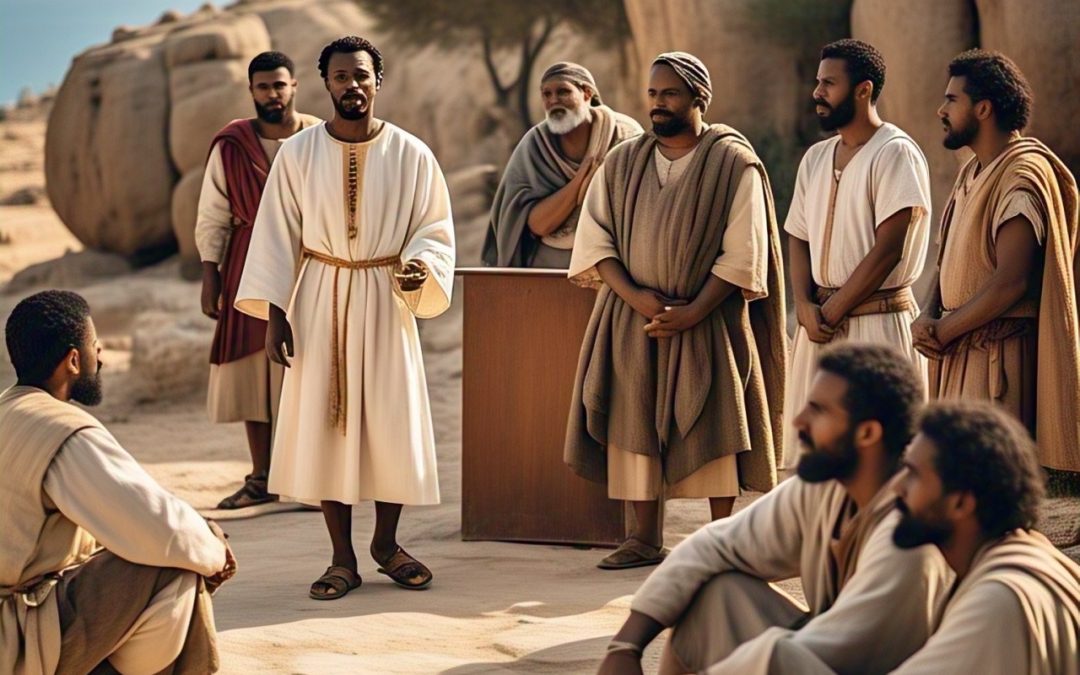
by Eron Henry | Apr 12, 2025 | Lent 2025
The Gospel of John boldly declares that “the Word became flesh and made His dwelling among us” (John 1:14), establishing continuity between the divine Logos present at creation and the human Jesus of Nazareth. This incarnation answers humanity’s perennial question: What is God really like? In Christ, abstract theological concepts about divine attributes find concrete expression in a human life. God’s power and will become accessible and interpretable through Jesus’ teachings, actions, relationships, and ultimate self-giving.
As the writer of Colossians affirms, “He is the image of the invisible God” (Colossians 1:15), suggesting that when we see Jesus, we see the Creator’s true face. The same divine power that spoke the universe into existence now expresses itself through healing touches, authoritative teachings, compassionate encounters, and ultimately, redemptive suffering.
In Jesus, divine power manifests not primarily through cosmic demonstrations but through transformative presence. The Creator’s omnipotence is channeled into specific acts of restoration—sight to the blind, dignity to the outcast, community to the isolated, forgiveness to the condemned. This represents not a diminishment of divine power but its most authentic expression, revealing that God’s highest purpose is not domination but relationship and reconciliation.
Perhaps most profoundly, the cross and resurrection reveal the Creator’s will to absorb the consequences of creation’s brokenness rather than imposing judgment from a distance. As Karl Barth observed, God’s omnipotence is most fully displayed not in abstract capacity to do anything, but in the freedom to determine what kind of power to exercise, the power of self-giving love.
The incarnation establishes continuity between the Creator’s original intentions and ultimate purposes. The same divine will that called forth light from darkness now shines “in our hearts to give us the light of the knowledge of God’s glory displayed in the face of Christ” (2 Corinthians 4:6). Jesus represents not a divine afterthought or emergency response but the fulfillment of creation’s trajectory, the revelation that God’s creative power has always been directed toward communion.
This perspective transforms our understanding of both creation and redemption, revealing them as complementary expressions of the same divine character. The God who delighted in bringing forth biodiversity and cosmic complexity is the same God who enters human particularity to initiate new creation from within.
Prayer
Eternal Creator, revealed in Jesus, You who shaped galaxies have shaped Yourself into human form, translating divine power into a language we could comprehend.
We stand in wonder before this mystery, that Your omnipotence finds fullest expression not in cosmic displays of force, but in a servant’s touch, a teacher’s wisdom, a healer’s compassion, a savior’s sacrifice.
Open our eyes to recognize Your true face, that when we look upon Jesus, we might see not merely a historical figure, but the very heart of the universe made visible.
Reshape our understanding of power by the pattern of Christ’s life—power that lifts up rather than dominates, power that restores rather than controls, power that connects rather than coerces.
As bearers of Your image, may we reflect the same creative will that we see in Jesus, to heal what is broken, to welcome what is marginalized, to forgive what seems unforgivable, to create new possibilities where hope seems lost.
Through Christ, who reveals Your glory.
Amen.






Recent Comments